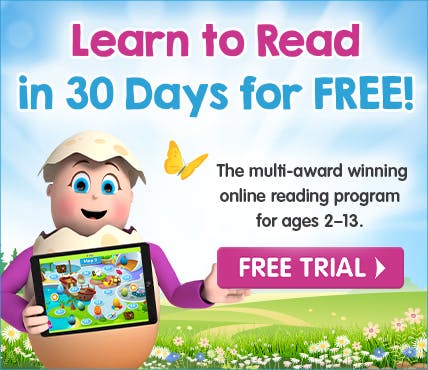


5 Signs Your Child is Ready for Early Chapter Books

Introduce your child to early chapter books with ABC Reading Eggspress. Let them choose from over 3000 e‑books in the online library and explore a variety of genres from fantasy, comedy, adventure and more! Free trial
Opening the door to early chapter books is an exciting milestone for both you and your child. It means they are ready to make a giant leap into faraway places and expand their imagination even further, with less reliance on pictures.
There are several skills children need to acquire before transitioning to early chapter books. Diving in before your child is ready can risk diminishing their enthusiasm for reading and lower their reading confidence.
That's why it's important to read the signs to find out if your child is ready for early chapter books.
Discover thousands of early chapter books for FREE with ABC Reading Eggspress!
Designed for ages 7–13, ABC Reading Eggspress has over 3000 e‑books to choose from in the online library across a wide range of genres including early chapter books in fantasy, adventure, comedy, history and more. Your child can also enjoy hundreds of self‑paced one‑on‑one lessons, exciting activities, live multi‑player games and so much more!
Here are some indicators that your child is ready to start reading early chapter books:
1. They remember what they have read
Early chapter books usually require breaking up a story over several sittings, so it's important that your child can remember what they have read a few days, or even a week later.
The day after you have read a new book with your child, ask them questions about the story, the characters and the events. A good idea is to encourage them to tell the story – in the right order – to a younger sibling or a relative. You can also help your child role‑play the story using fun props, or to draw picture of key events and arrange them into chronological order.
2. They can make predictions about stories
Part of the excitement of reading chapter books is anticipating what might happen next. The ability to make predictions about a story signifies that your child has the comprehension skills needed to fully understand what they read. To encourage your child to make predictions, stop periodically while reading to ask them what might happen next. Readers with strong comprehension skills will be able to take what they have already read and use that information to make predictions.
3. They can picture stories in their head without visual aids
Early chapter books rely less on pictures and illustrations to create details about a story. Before reading chapter books with your child, see if they can sum up or illustrate a story they've just read without looking at any of the pictures.
4. They know how to choose books
Reading longer stories means that your child needs to be able to stay interested long enough to reach the end. By the time they transition to early chapter books, they would ideally have a preference, whether it be a particular genre (e.g. comedy, adventure, history) or subject matter. Let them choose which books they want to read and help them choose by looking at the cover, reading the back blurb, scanning the text (font size, paragraph length), and deciding if it's a book they want to read.
5. They are equipped with enough vocabulary
Your child should know enough words to embark on early chapter books. Reading a book with too many unfamiliar words can hurt their confidence and motivation. Remember to use the five finger rule before starting a new book. Your child should also be able to use context clues to determine the meaning of words they don't know. Try these tips to build your child's vocabulary at home.
Some other tips to consider when introducing your child to early chapter books:
Start with shorter chapters – avoid taking on too much too soon, and ease in with shorter reading sessions.
Choose books with some pictures – early chapter books with pictures and illustrations will ease the transition.
Talk about the book and make predictions – between sittings, have daily conversations about the story and what you think might happen next.
Show them how to recap – pick up where you left off between sittings by showing your child how to revisit the last chapter and refresh your memory.
Don't move away from picture books – continue reading picture books with your child and maintain reading variety.
Discover thousands of early chapter books for FREE with ABC Reading Eggspress!
Designed for ages 7–13, ABC Reading Eggspress has over 3000 e‑books to choose from in the online library across a wide range of genres including early chapter books in fantasy, adventure, comedy, history and more. Your child can also enjoy hundreds of self‑paced one‑on‑one lessons, exciting activities, live multi‑player games and so much more!


